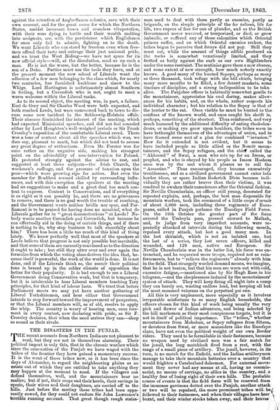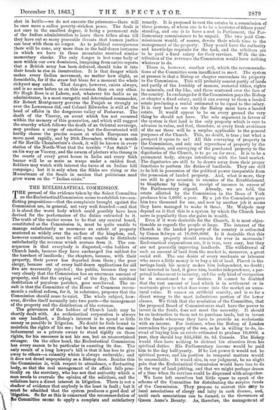THE DISASTERS IN THE PUNJAB. T HE recent accounts from Northern
India are not pleasant to read, but they are not in themselves alarming. Their political import is only this, that in the chronic warfare which since the annexation of the Punjab we have waged with the tribes of the frontier they have gained a momentary success. It is the wont of these tribes now, as it has been since the days of Alexander, to regard the neighbouring plains as an estate out of which they are entitled to take anything they may happen at the moment to need. If the villagers can defend themselves, well, and the mountaineers bear no malice; but if not, their crops and their herds, their savings in -specie, their wives and their daughters, are carried off to the hills. Just before the mutiny these tribes had been appa- rently cowed, for they could not endure Sir John Lawrence's terrible running account. That great though rough states- man used to deal with them partly as enemies, partly as brigands, on the simple principle of the lex talionie, life for life, two rupees of fine for one of plunder, and as the British Government never wavered, or temporized, or died, or grew imbecile, or suffered any of those calamities which Oriental princes suffer, and on which Oriental enemies reckon, the tribes began to perceive that forays did not pay. Still they must eat, while the amount of things edible produced on the rocks is somewhat vexatiously limited, and they fretted as hotly against the curb as our own Highlanders under the same restraint. The mutinies gave them a new chance, and some extent of new strength, how much nobody exactly knows. A good many of the hunted Sepoya, perhaps as many as three thousand, took refuge with the hill chiefs, bringing many more mouths to be filled, a few decent muskets, some- tincture of discipline, and a strong indisposition to be tab'. alive. The Punjabee officer is habitually somewhat gentle to the mountaineer, appreciates his cool daring, makes allow- ances for his habits, and, on the whole, rather respects his individual character ; but his relation to the Sepoy is that of the terrier to the rat. Once visible he must be hunted to the- confines of the known world, and once caught his shrift is, perhaps, something of the shortest. Thus reinforced, and very much harassed by the additional difficulty of eating rhododen- drons, or making rye grow upon boulders, the tribes seem to have bethought themselves of the advantages of union, and to have framed some sort of a plan for combined "invasion." How far it extended is not evident, but it seems to have included people so little allied as the Boneir moun- taineers, and the Sepoy refugees, and the chief called the- " Akhoond " of Swat, a man who sets up for an Imam, or prophet, and who is obeyed by his people as Imam Hashein once was by the sect whom it pleases us to call the "Assassins." Thus encouraged, they became excessively troublesome, and as a civilized government cannot enter into border ideas, or spare Indian Roderick Thetis because indi- vidually they are rather braver than their victims, it wan resolved to awaken their consciences after the Oriental fashion. Sir Neville Chamberlain, an officer still young, decorated for repeated exploits, and, perhaps, the best man disposable for mountain warfare, took the command of a little corps d'armie- of about 5,000 men, including three regiments of Euro- peans, called in Punjab parlance the Eusofzye Field Force. On the 19th October the greater part of the force- entered the Umbeyla pass, pressed onward to Malkah, and, to judge from very imperfect accounts, were re- peatedly attacked at intervals during the following month, repulsed every attack, but lost a good many men. In the last skirmish, which is not an isolated one, but the last of a series, they lost seven officers, killed and wounded, and 128 men, native and European. Sir- Neville Chamberlain. was in the latter list, his force was en- trenched, and he requested more troops, required not as rein- forcements, but to "relieve the regiments" already with him in the field. That strangely worded demand means, we imagine, that he is not beaten, but that his men are worn out with cold, excessive fatigue,—mentioned also by Sir Hugh Rose in his telegram,—and the sleeplessness induced by the mountaineers' system of attack. They will keep firing all night into a camp. they can barely see, wasting endless lead, but keeping all but the most seasoned veterans on the perpetual qui dye. All this is very unpleasant, more especially as it involves irreparable misfortune to so many English households, the officers chosen for this kind of work being usually the very pick and flower of Indian adventure, and being selected by the hill marksmen as their most conspicuous targets, but it is- not in itself of political importance. The "tribes," whether mountaineers from Mohabun, or Sepoy refugees from Sitana, or devotees from Swat., or mere marauders like the Eusofzye clans, have not even the political weight of our own Border riders. They used to be formidable in their fastnesses, because no weapon used by civilized men was a fair match for the jezail, the long matchlock fired from a rest, with the range of a small piece of artillery. The jezail, however, in its turn, is no match for the Enfield, and the Indian artillerymen manage to take their mountain batteries over a country that would frighten a Cumberland dalesnum. For external move- ment they never had any means at all, having no commis- sariat, no means of carriage, no allies in the country, and a healthy fear of losing sight of their own hills. The probable course of events is that the field force will be renewed from the immense garrisons dotted over the Punjab, another attack or two will be repulsed, the more prominent tribes will be( followed to their fastnesses, and when their villages have beer ‘ burnt, and their winter stocks taken away, and their braves shot in battle—we do not execute the prisoners—there will be once more a sullen poverty-stricken peace. The fault is not ours in the smallest degree, it being a permanent rule of the Indian administration to leave these tribes alone till they have cut so many peaceable throats that human justice can bear with them no longer. As to political consequences there will be none, any more than in the half-dozen instances in which we have in these mountains received similar momentary checks. The only danger is lest some body of men within our own dominions, imagining from native reports that a British army has been defeated, should take it into their heads to rise in insurrection. It is that danger which makes every Indian movement, no matter how slight, so formidable, for if the straw but blaze for a moment the whole rickyard may catch. -That danger, however, exists always, and is no more before us on this occasion than on any other. Sir Hugh Rose is at Lahore, and, whatever his faults as an administrator, is a most energetic and determined commander, Sir Robert Montgomery governs the Punjab as strongly as ever the Lawrences did, and Colonel Edwardes is still at the head of affairs in the dangerous valley of Peshawur. The death of the Viceroy, an event which has not occurred within the memory of this generation, and which will suggest the anarchy which follows the death of an Oriental sovereign, may produce a surge of emotion ; but the discontented will hardly choose the precise season at which Europeans can move most rapidly, and by 20th December, within a month of Sir Neville Chamberlain's check, it will be known in every station of the North-West that the terrible "Jan Sahib" is on his way at Viceroy, and the swarm of plotters who throng in the courts of every great house in India and every Sikh bazaar will be as mute as wasps under a sudden frost. Soldiers may watch with interest the turns of an Indian hill campaign ; but it is only when the Sikhs are rising or the Mussulmans of the South in motion that politicians need grow warm on the "Indian crisis."



































 Previous page
Previous page